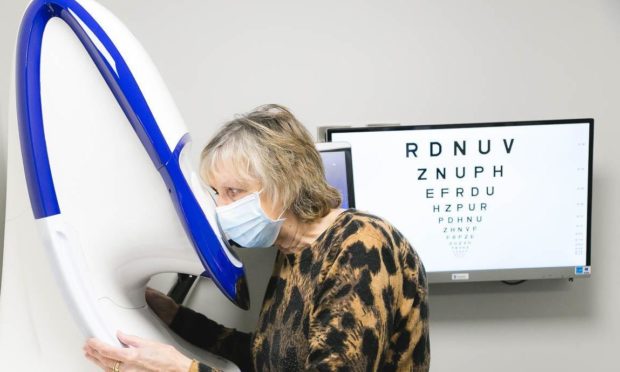Researchers from Dunfermline have found that a quarter of adults have not had an eye test in the last three years.
And a third believe their eyesight has worsened during the pandemic.
Carried out by retinal imaging technology experts Optos, who are based in the Fife town, the research discovered around 3.2 million UK adults have never been for an eye exam – potentially leaving eye conditions undiagnosed.
The findings come despite 78% of adults stating that eye health is very important to them, with more than 2,500 people from around the UK responding to the research survey.
‘I didn’t think I had any symptoms’
Eye conditions can affect anyone, regardless of age.
Mark, 40, had abnormalities discovered by his optician after attending a routine appointment: it was discovered he had a detached retina which if left untreated can lead to complete blindness.
Mark says: “Looking back, I didn’t think I had any symptoms. I was getting occasional sore heads but put that down to working from home and sitting in front of a screen for most of the day.
“I had my eye exam booked anyway so thought I’d go just for a check-up. I was completely shocked to receive a call afterwards from my optician to say I needed to go to hospital straight away to get the detachment sorted.
“I was told by doctors at the hospital that I could have lost my vision in my left eye if it had been left untreated.”
Routine check-ups
Going to the optician regularly is important to maintain good eye health. The NHS recommends getting an eye test every two years, to check for conditions such as glaucoma and cataracts, and ensuring prescriptions for glasses and contact lenses are up to date.
This #WorldHealthDay, we want to remind you that eye tests don't just check your sight.
They can also help us spot lots of other health conditions… you'd be surprised what we can see by looking into your eyes 👇 pic.twitter.com/szPDSLq8Ei
— Specsavers (@Specsavers) April 7, 2021
According to the NHS, pain is rarely a symptom of eye problems. Signs of diabetes and cancer can also be visible in the eye, making it even more important to attend regular check-ups.
However, the Optos research also highlighted the impact the pandemic continues to have on healthcare for issues unrelated to Covid-19.
Findings showed 40% of respondents claimed the pandemic had prevented them from attending an eye examination, either due to safety concerns, lack of appointments available, or because of shielding or self-isolating.
Concerns around eye health have arisen primarily from the number of people now working from home. More screen time for work and leisure has contributed to increased eye strain which can cause difficulty reading and night vision, as well as a rise in headaches and migraines.
‘You only get one pair of eyes’
After discovering his detached retina, Mark received emergency laser surgery to save the sight in his eye, ultimately saving his eyesight.
He continues: “I’m so grateful that this was picked up when it was. Since the operation, my eyesight has been completely normal, and I’ve since gone back for check-ups and been given the all clear.
“I can’t stress the importance of getting an eye exam enough. It’s something I think many people put off, especially if they don’t have any symptoms, but I’m a living example of why that shouldn’t matter.
“The appointment doesn’t take long, and I’d encourage anyone who is overdue for an exam to book one now. You only get one pair of eyes, so we really need to look after our vision.”
‘Increasing concerns around eye health’
Gareth Steer, VP of European Sales at Optos says: “Attending regular eye appointments is essential. With more people than ever working or studying from home there are increasing concerns around eye health and people delaying appointments.
“It is critical that everyone is educated on the importance of eye care and attends regular eye exams, even if they don’t have an obvious problem.
“At Optos, we’re doing all we can to help raise awareness around the benefits of undertaking regular eye care examinations. The survey clearly shows that eye health is very important to people so it’s essential we all make our vision a priority and do everything we can to find problems and treat them early.”

